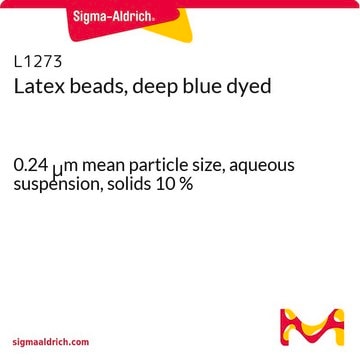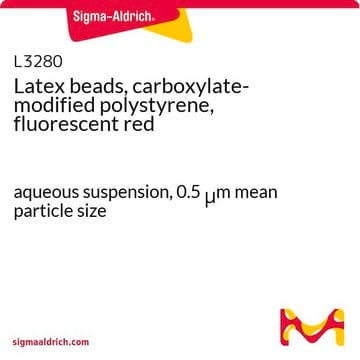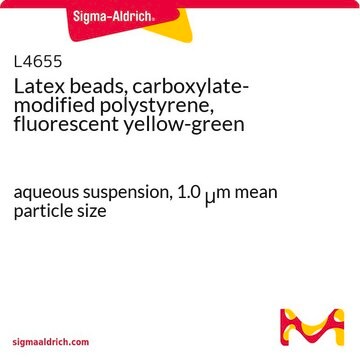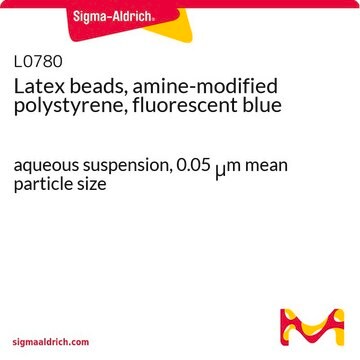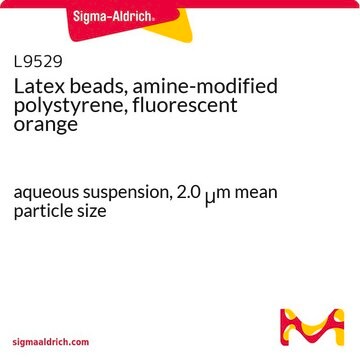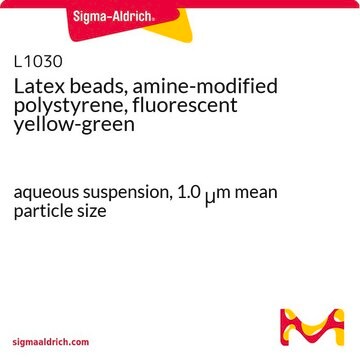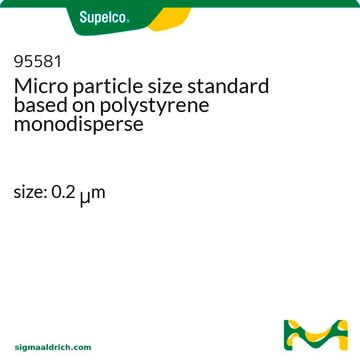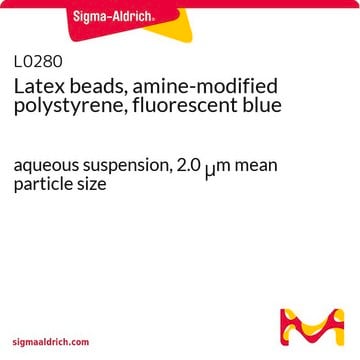L1148
Latex beads, deep blue dyed
0.055 μm mean particle size, aqueous suspension, solids 10 %
Iniciar sesiónpara Ver la Fijación de precios por contrato y de la organización
About This Item
Productos recomendados
¿Está buscando productos similares? Visita Guía de comparación de productos
Application
Latex beads have been used to study the regulation of primary mesenchyme cell migration in the sea urchin embryo and to gain a better understanding of the role of ecto-NAD+ glycohydrolase, an enzyme predominantly associated with phagocytic cells. Latex beads have also been used to develop a new technique for measuring the plaque-forming cell (PFC) responses to bacterial antigens.
Features and Benefits
Dye incorporated into beads, not surface-linked
Storage Class
12 - Non Combustible Liquids
wgk_germany
WGK 3
flash_point_f
Not applicable
flash_point_c
Not applicable
Certificados de análisis (COA)
Busque Certificados de análisis (COA) introduciendo el número de lote del producto. Los números de lote se encuentran en la etiqueta del producto después de las palabras «Lot» o «Batch»
¿Ya tiene este producto?
Encuentre la documentación para los productos que ha comprado recientemente en la Biblioteca de documentos.
Los clientes también vieron
Gary G Martin et al.
The Biological bulletin, 211(3), 275-285 (2006-12-21)
Peritrophic membranes (PTMs) are secreted acellular layers that separate ingested materials from the gut epithelium in a variety of invertebrates. In insects and crustaceans, PTMs are produced in the midgut trunk (MGT, or intestine), but the MGT in decapod crustaceans
O Bagasra et al.
Journal of immunological methods, 49(3), 283-292 (1982-03-26)
A new latex bead technique for measuring the plaque-forming cell (PFC) responses to bacterial antigens is described. This technique has been designed for the study of antigens that cannot be readily coated onto SRBC but may also used for antigens
C A Ettensohn et al.
Developmental biology, 117(2), 380-391 (1986-10-01)
After their ingression, the primary mesenchyme cells (PMCs) of the sea urchin embryo migrate within the blastocoel, where they eventually become arranged in a characteristic ring-like pattern. To gain information about how the movements of the PMCs are regulated, a
C D Muller et al.
Biology of the cell, 68(1), 57-64 (1990-01-01)
In order to gain a better understanding of the role of ecto-NAD+ glycohydrolase, an enzyme predominantly associated with phagocytic cells, we have studied its fate in murine macrophages (splenic, resident peritoneal and Kupffer cells) during phagocytosis of opsonized on mannosylated
Delfine Cheng et al.
Micron (Oxford, England : 1993), 132, 102851-102851 (2020-02-25)
Kupffer cells are liver-resident macrophages that play an important role in mediating immune-related functions in mammals and humans. They are well-known for their capacity to phagocytose large amounts of waste complexes, cell debris, microbial particles and even malignant cells. Location
Nuestro equipo de científicos tiene experiencia en todas las áreas de investigación: Ciencias de la vida, Ciencia de los materiales, Síntesis química, Cromatografía, Analítica y muchas otras.
Póngase en contacto con el Servicio técnico